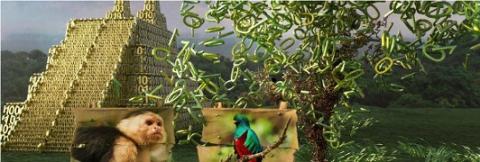Connecting Computer Science and Mesoamerican Culture

Three faculty from UCSB have been awarded a highly-competitive award from the National Science Foundation’s Broadening Participation in Computing Program. Principal Investigator Diana Franklin and Co-Principal Investigator Phillip Conrad, both from the Department of Computer Science, worked with Co-Principal Investigator Gerardo Aldana from Chicana/o Studies to develop a program that attracts under-represented groups to Computer Science.
Nationwide, neither females nor Latina/os are pursuing computer science at rates reflective of their demographic representation in the general public. The reasons behind the under-representation of females and Latina/os in Computer Science are both multiple and varied. Yet the project’s goal is to focus on cultural themes that attract both populations.
The project will design, offer, and evaluate a summer program to attract students who would not normally consider Computer Science. This program will give students confidence in their ability to succeed in the computing, provide a positive experience so that they will consider Computer Science when they make their career decision, and enroll them in a long-term academic counseling and tracking program to increase their chance of completing a college degree.
The program employs themes that the investigators believe are attractive to females and Latina/os, and their camp is careful to only use Computer Science as a tool to complete interesting projects related to those themes. The themes are Mesoamerican culture and the conservation of endangered species—themes that are particularly attractive to Latina/os and females and their families in Santa Barbara. Other institutions can replicate this approach by using different culturally-relevant topics that appeal to their target populations. Hence, the focus is not on ecology or cultural studies as an end, but rather as a means to interest students in computing.
During the two-week, full-day camp, students will learn how animals were important to Mayan life in Mythology and rituals, using the computer to draw pictures and animate a Mayan story using Mayan style art. To create animations, students will be using Scratch, a programming language designed specifically for middle school students. Students will work in pairs to populate a website to tell other students about the plight of a particular endangered species today. Finally, students will have the option of making a computer game or a virtual pet application with Scratch. Interleaved with this work, the program will have outdoor games that use computer science algorithms, projectile launching related to a Mayan ballgame, guest speakers and tours.
More information on Animal Tlatoque and other similar efforts can be found at the Center for Computing Education and Diversity website: http://discover.cs.ucsb.edu or by contacting Diana Franklin at franklin@cs.ucsb.edu.